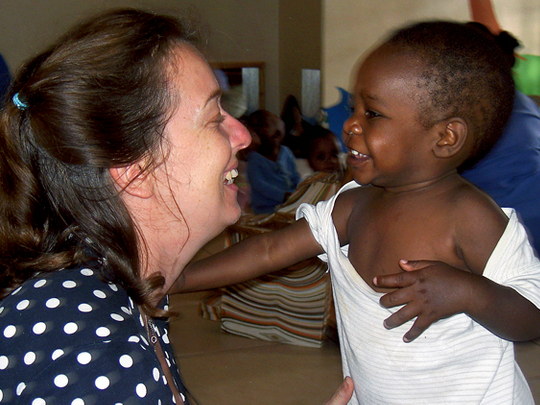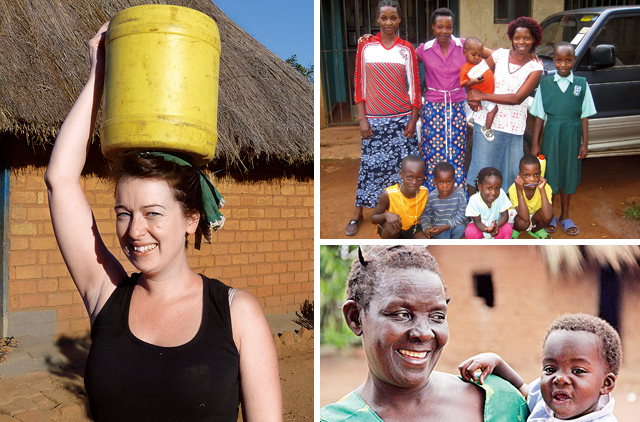
Staring at the tiny casket in the baby orphanage where I was volunteering, I felt an incredible sense of sadness that the tiny body inside it had never truly been loved by anyone. No one would miss him now that he was gone. The world had failed him.
Abraham had been just eight weeks old when he was abandoned at a taxi park in Kampala, the Ugandan capital, by his destitute mother, ending up later at Sanyu Babies’ Home in Kampala, where I’d been volunteering in June 2006. He died from meningitis, two months later.
I fell in love with Africa after going on a school trip to Gambia when I was 17. Later, I became a successful TV producer and worked on reality shows such as UK’s Big Brother, but I always dreamt of going back to Africa to look after babies. I asked my friend who had been to an orphanage in Uganda about this.
“You won’t be able to cope,” he told me. That was like waving a red flag in front of a bull. ‘I’ll show you,’ I thought. A month later, I was in Kampala, changing nappies and giving bottles to 50 abandoned babies at Sanyu.
From 2005, for the next three years, I devoted six months of the year to volunteering in Africa. The other half of the year I spent working. Life was surreal. One day I was on a glamorous TV set, the next, I was going to a rundown police station to pick up a newborn who’d been dumped there.
Uganda, one of the poorest countries in the world, had a huge problem with baby abandonment. Crippled by poverty, desperate mothers were forced to desert their newborns because they couldn’t care for them properly.
At least once a week at the babies’ home we’d be contacted by the local probation service or hospital staff about another neglected child they’d discovered. I loved cradling these tiny bundles in my arms. But I couldn’t bear to think how long they’d languish in the orphanage and how harmful growing up in this environment would be.
Each baby I cuddled left an impact on me, but Abraham changed all my plans and my entire life. After he’d died, totally unloved, I vowed to do all I could to make sure no other child ended up like this.
A second chance
I’d learnt that 80 per cent of babies in orphanages had mothers, fathers, grandmothers, uncles or another relative who could care for them if they were only given some support. I wanted to give these children a second chance at life, to reunite them with their biological families or, if this wasn’t possible, with equally loving adoptive Ugandan parents. I knew this might be impossible, but I had to try.
“I’m moving to Uganda to set up a home for babies,” I told my parents after coming home from work one day in the UK.
Mum excitedly began planning a golf day and local fashion parade to raise money for my charity, Child’s i Foundation. My parents let me move back home and set up a makeshift office there. But one day Dad knocked at the door. “Shouldn’t you be settling down and getting a mortgage like your friends?” he asked me, a stern look on his face. But today he’s one of my biggest supporters.
Now that I’d made the decision, there was no going back to my ‘other life’, the glitzy TV world. In January 2008 I quit my job to concentrate full time on setting up my charity. It had once been my dream to work in TV and although it let me have a comfortable lifestyle, it no longer fulfilled me like my volunteer work in Africa.
Having worked in the TV industry for seven years, I had countless contacts to help me with my project and I was armed with the best skills to garner support: I could tell a visual story that would make people aware of Uganda’s baby abandonment problem.
Keen to jump on board
My friends, graphic designers, psychologists, social workers and child-protection experts among others, were all roped in to help. “How much do you need?” I’d expected people to moan. Instead they all asked, “What can I do?”
My friend Kirsty, a digital strategist, laughed when I told her I wanted to build a website, but had estimated it would cost thousands. “You can do everything for free,” she said. She gave up an entire weekend and at the end of it I had a website, www.childsifoundation.org.
During the next two years I jetted back and forth between the UK and Africa, living at orphanages when I was in Uganda and getting to know more people there. I stayed at my parents at the weekend when I was back home, but during the week I couch surfed at my friends’ houses. All my money was going into the project.
I wanted to create a worldwide community of supporters who I’d keep updated on the charity’s progress via video, YouTube, Facebook and other forms of communication, so I called my organisation Child’s i Foundation, the ‘i’ standing for ‘interactive’.
Despite having raised the money I needed, I couldn’t afford to pay myself, so I was over the moon to win the 2010 Vodafone World of Difference Award. This programme gives 500 people the chance to work for their dream charity and get paid. They would pay my salary and expenses for a whole year, which meant I could move to Uganda full time to launch the charity. I won £45,000 (Dh267,245), which paid my salary for a year and all the expenses to set up the project in Uganda.
In December 2009 I went to Africa with a finance director, TV producer and a social worker. We rented a home in a nice Kampala suburb, which had room for 24 babies.
Each tot would have their own personal carer who would give them the attention they needed to recover while we found them a permanent home within the next six months to avoid long-term psychological damage. I also wanted our Ugandan social workers to also figure out what drove women to abandon their children in the first place, to prevent this from happening.
The home was derelict, but the volunteers from a string of countries including the UK, Holland and Australia, painted the rooms, covering the walls in a palm tree mural, and set up cots. Each one arrived with a suitcase full of baby clothes. We called our babies’ home Malaika, meaning ‘angel’ in Swahili.
The doors finally opened in April 2010. One of our first babies, Samuel, barely a few months old had been left by his mother at a petrol station. When he arrived at the home I stayed up with him all night, feeding him through a tube every ten minutes, willing him to survive.
Our social work team eventually tracked down his grandmother after contacting some local people. She was so ecstatic to hear that she had a grandson that she dropped her phone, jumped on a bodaboda (motorbike taxi) and came to Malaika immediately.
Reunited
“He’s mine,” she whispered, scooping Samuel up in her arms. After thorough assessments to ensure he’d be safe in her care, Samuel went home with his grandmother. I cried saying goodbye. There were tears of sadness as I’d grown fond of him, but I was happy to know Samuel would grow up cherished in his family.
We’d kept our sponsors informed of the good news through our video updates on the website. These posts came in handy for letting the children’s ‘i families’ know about the babies.
In August that year, baby Joey needed critical heart surgery. It was a race against time to find the Dh60,000 needed to fly him to South Africa for treatment. But in only 38 hours we managed to raise the money using Facebook, Twitter and JustGiving. Now Joey is a noisy 18-month-old, who has really bonded with his adoptive Ugandan parents, George and Desire, and his brother and sisters Gabriel, Danielle and Kayla.
Despite the fact there is a stigma attached to local adoption in Uganda, with many believing it’s dangerous to take a child from a different clan into their home, our first media adoption campaign in 2011, with the government’s support, was a huge success. From there, we produced an ad for Ugandan TV, a talk show and erected a huge billboard over a highway.
Child’s i Foundation has now found homes for over 80 abandoned children all across Uganda. I never expected the charity to come so far so quickly. We provide the best possible care for babies between zero and two, but nothing beats growing up in a loving family.
Recently, baby Emily was found dumped in a Kampala bush and left to die. Our social workers are working to find her parents, but if they can’t do that she’ll be placed with another Ugandan family. Emily will hopefully spend her first Christmas with parents, instead of an orphanage. I’m so proud of this.
I’ve sacrificed so much to set the charity up, but it’s all been worth it to know that children will be growing up in loving families.













